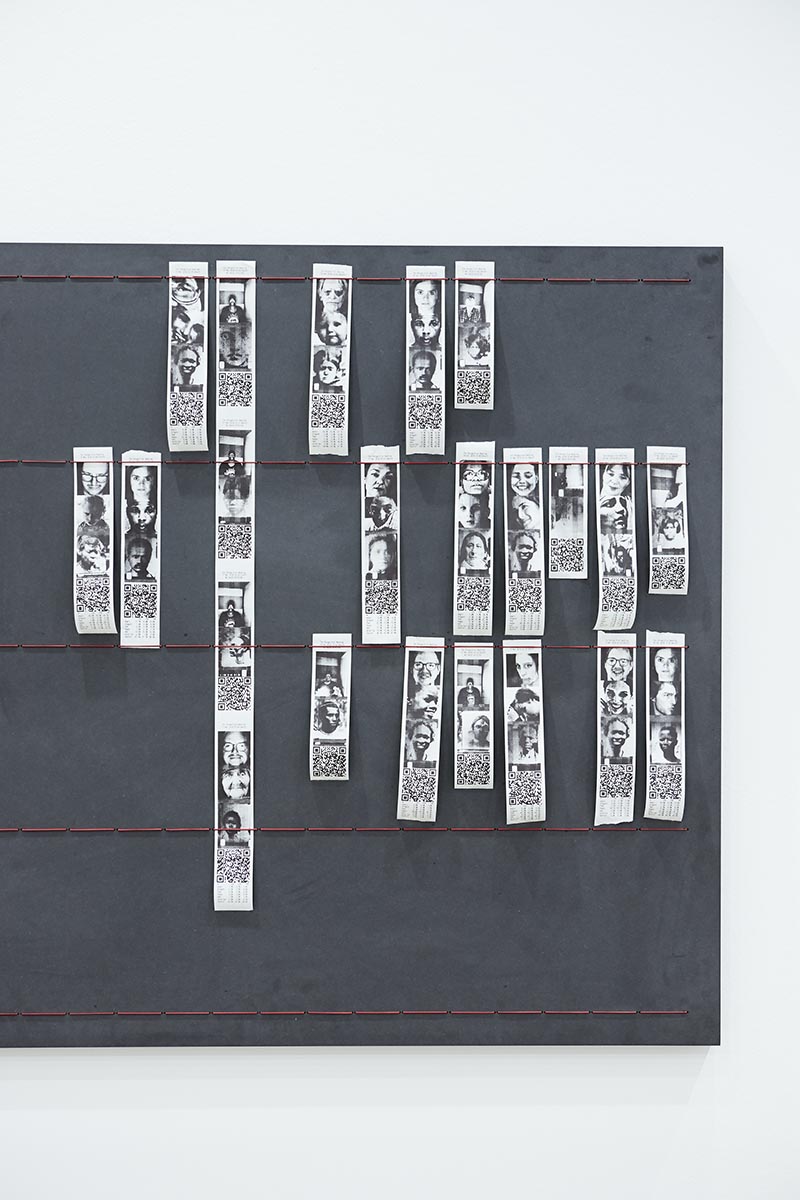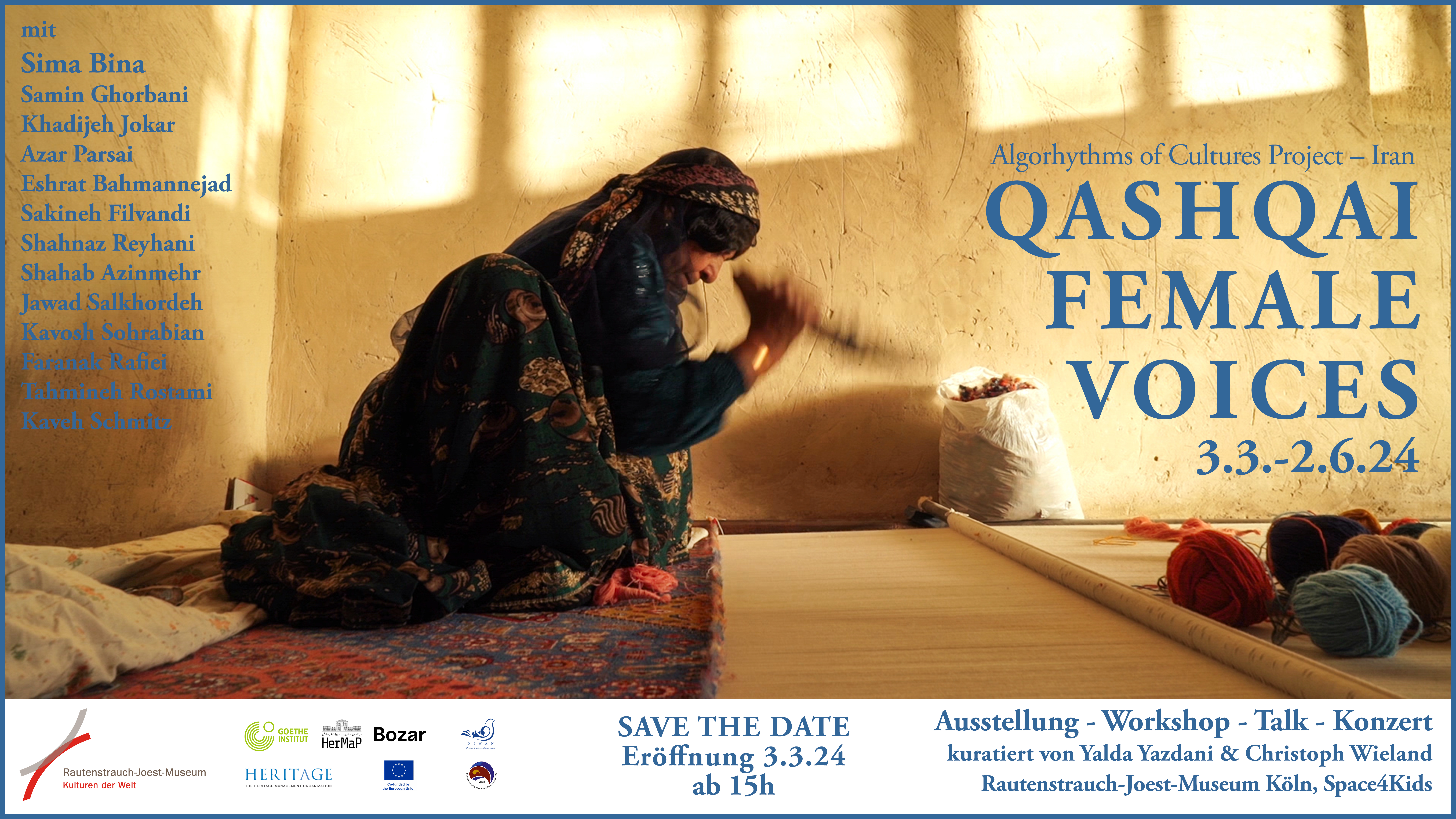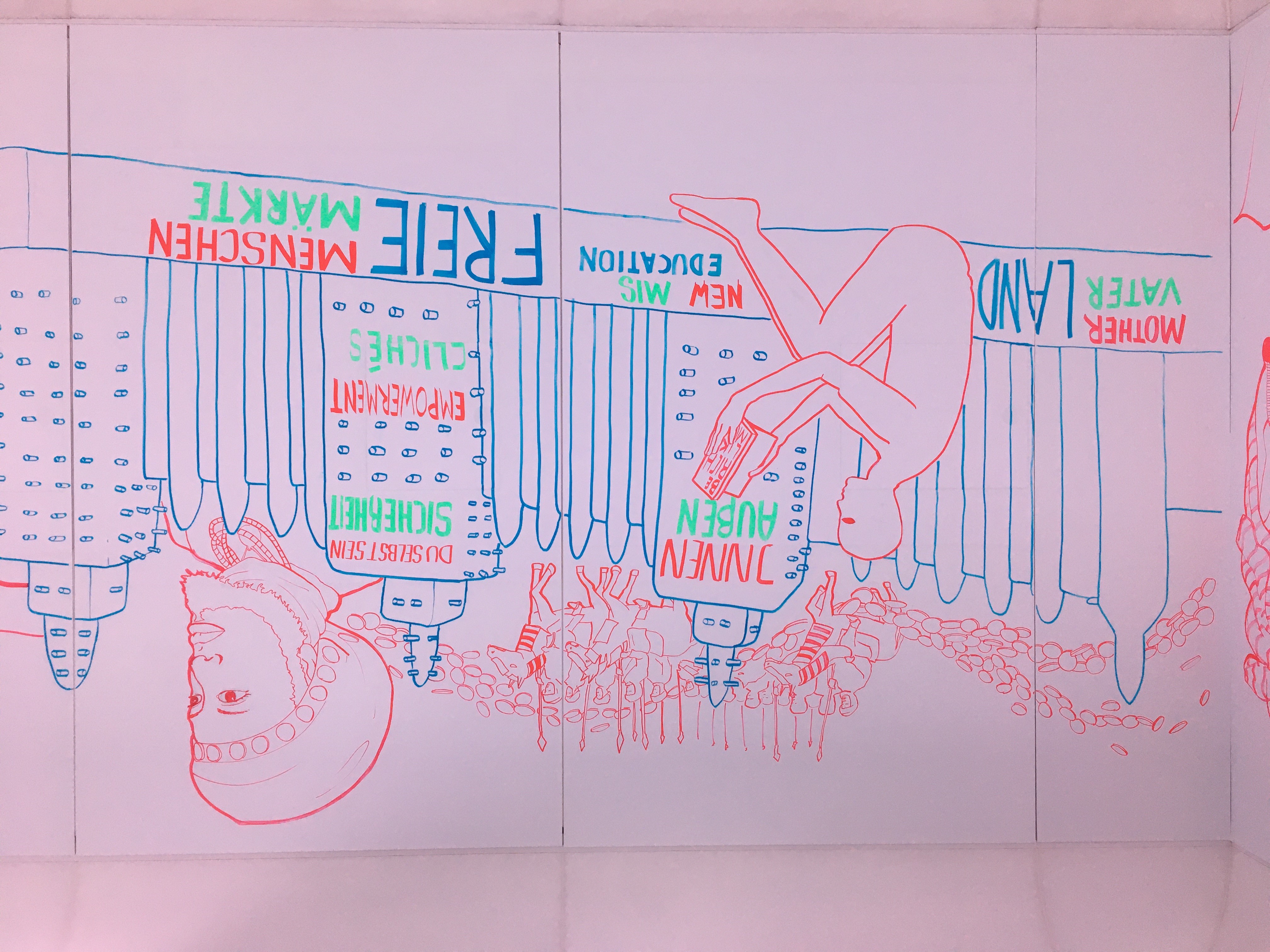Interventions
Intervention
STAGEAWEAR
(to) stage * (be) aware * (to) wear

How do you feel about fashion? And what does sustainability mean to you? With the STAGEAWEAR project, three students of the "Sustainable Design" course at the ecosign/Akademie für Gestaltung want to overcome the supposed gap between young people and museums.
STAGEAWEAR provides insights into the lifeworlds of young people: Who are they? What's on their minds? What do they define themselves by? For this purpose, a part of the section "The Body as Stage" in our permanent exhibition was revised. Here it is shown that people all over the world use clothing, accessories and body adornments to provide information about the position they have or would like to have within their community. Carmen Servos, Leonie Hogefeld and Sarah Menzer have expanded this presentation with the interactive part STAGEAWEAR. Visitors to our permanent exhibition can actively participate in the project and share their thoughts, wishes and opinions. In addition, favourite songs can be added to the STAGEAWEAR playlist on our Youtube channel.
STAGEAWEAR is a student project of ecosign/Akademie für Gestaltung with the RJM as part of the thematic series "Rethink Fashion!" in cooperation with Integrationshaus e.V. with photographer Fadi Elias. Sponsored by the Landschaftsverband Rheinland.
Intervention
From 7 March 2024
The Recognition Machine

Who are the people looking back at us from the photos in our collection? What does the colonial past have to do with each and every one of us? The RJM holds around 100,000 photographs from all over the world. Many were taken and collected in the context of the colonial appropriation of countries. Based on external characteristics, their inhabitants were inserted into racist orders. This created or reinforced prejudices that still have an impact today.
The "Recognition Machine" focuses on the often unknown and involuntarily photographed people in the photos and questions classification and evaluation systems: Using facial recognition software, the image that visitors take in the machine is analysed and linked to a portrait from the colonial era. This is based on the FER2013 AI model, which has been trained to recognise emotions. The Recognition Machine was fed with hundreds of photos from the RJM and other European museums. The artists also scrutinise modern surveillance systems. Facial recognition is widely used today, but is often imprecise and biased: The categorisation according to emotions in the Recognition Machine is just as questionable as the classification of people into supposed ethnic groups.
In 2019, Belgian artist Antje Van Wichelen was a guest at the RJM for the Artist Meets Archive scholarship programme of the International Photoscene Cologne. During her stay, she delved deep into the museum's historical photo archive. Together with programmer Michael Murthaugh, she developed the "Recognition Machine" and exhibited it for the first time in 2019 in the "NOISY IMAGES" exhibition at the RJM. The work was exhibited at the Dakar Biennale in 2022. Now it can be experienced permanently in the museum.
With photographs from the archives of the following institutions:
Rautenstrauch-Joest Museum, Wereldculturen Museum (Netherlands), Musée du Quai Branly (France), Africamuseum Tervuren (Belgium), Pitt Rivers Museum (United Kingdom)
Realised with the support of Moussem Nomadic Arts Center (Brussels) and nadine - laboratory for contemporary arts (Brussels)
Multimediainstallation
3 March to 2 June 2024
Algorhythms of Cultures – Iran
QASHQAI FEMALE VOICES

The exhibition intervention invites children and adults to experience the inspiring stories of the Qashqai women from the south-west of Iran.
The melodic chants of the Qashqai women blend ancient knowledge, spiritual experiences and a rich storytelling tradition, which are reflected in the ornate patterns and symbols of their famous carpet works.
The Qashqai, especially the women, are among the marginalised population groups in Iran who are exposed to political, economic and climatic challenges. Despite these threats, Qashqai women are doing everything they can to preserve and pass on their unique culture. Their cultural heritage combines song, crafts, ritual and visual art to create a synthesis of the arts that has endured for centuries. As they weave their carpets, the melodies and rhythms of their songs merge with the sounds of their hands and tools. They transform individual threads of wool into a unique visual ensemble that preserves their stories and experiences for future generations.
The Algorhythms of Cultures Project's "Qashqai Female Voices" is dedicated to the women of Iran and their families. It explores and communicates their resilience, culture and knowledge and advocates for their voices to be heard. The project brings together Iranian and European actors, artists and curators to commemorate and renew the musical and visual heritage of the Qashqai.
The intervention will be accompanied by a workshop and music programme. Please find the dates in our event calendar.
With
Sima Bina, Samin Ghorbani, Khadijeh Jokar, Azar Parsai, Eshrat Bahmannejad, Sakineh Filvandi, Shahnaz Reyhani, Shahab Azinmehr, Jawad Salkhordeh, Kavosh Sohrabian, Faranak Rafiei, Tahmineh Rostami, Kaveh Schmitz
Curators
Yalda Yazdani & Christoph Wieland
Scientific advice
Eshrat Bahmannejad, Shahnaz Reyhani, Naser Reyhani, Awahzolla Safari, Damoon Sheshbolooki.
With the kind support of
Goethe Institute, German Embassy, HERITAGE Management Organisation, Bozar - Center for Fine Arts Brussels, Directorate General International Partnerships - European Commission.
In co-operation with DIWAN Köln - Deutsch-Iranische Begegnungen e.V., AWA - Deutsch-Iranischer Kultur und Bildungsverein e.V., CrossCultureCologne, Galerie Schiras Berlin.
Special thanks to the commitment and trust of the Qashqai communities inside and outside Iran, to whom this project is dedicated.
RJM reloaded #1
Intervention by Nando Nkrumah

In our first “RJM reloaded”, the Cologne artist Nando Nkrumah considers prejudices against people of colour. His installation appears in the exhibition area “The Misaligned Gaze: Prejudices”, conceived for the permanent exhibition, inaugurated in 2010 and revised in collaboration with our diversity manager Carla de Andrade Hurst and researcher Dr. Clara Himmelheber. The museum strives to engage more actively in the debates about structural racism and take a clear position. How can we talk about racism and prejudice without hurting those affected? How can we avoid reproducing racist images? How can we let those affected speak about their concerns and needs? “RJM reloaded #1” studies and deconstructs prejudices step by step.
Nando Nkrumah, born in 1979 in Kumasi, Ghana, and raised in the Westerwald area, Germany, lives as an artist and designer in Cologne. He studied design in Essen and Singapore, and media design at the Academy of Media Arts in Cologne. In 2D or in 3D, his works play with Ashanti images and symbols, combining the latest computer technologies with stencil art, alienated and fragmented photos, texts, patterns and screen prints.
